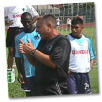More on Basic Paradigm
You do not have to play the sport to know the sport. Today there are many tools to use to learn the sport. Virtually every sport has instructional books and videos available that explain the sport from a technical and tactical perspective. Also remember the rules of the sport also dictate conditioning. That is why High School, Collegiate and NFL football have subtle differences. To continue the American football example something like a no huddle offense will impact how you condition your offensive players. As far as having played the sport especially at a high level I do not feel it is important at all, in fact it can he a hindrance. Not playing the game allows a completely unbiased perspective. I have found that many people who were stars think they did things one way when in actual practice they did it better. This reminds of a conversation with Buddy Bell, current manager of the Kansas City Royals, when he took over as our field coordinator with the White Sox. He took me aside and told me that because I had never played the game and he had played in the big leagues for 19 years that I what I was doing was virtually worthless, at least he was honest. This is a very typical attitude, as far I am concerned not a healthy attitude in terms of progressing. Classic example of one experience 19 times!
When looking at game demands I would use GPS and accelerometer data if available. This data enables the conditioning and strength training to be more exact and also to be adapted for the individual athlete. Many people have used heart rate data extensively; personally I have not put as much stock in this. I feel it is pretty predictable and there are too many artifacts in the data to base training sole on heart rate. (Obviously not on Polar’s payroll)
I think it is also important that the game itself and practice for the game plays a huge roll in actually conditioning the player. The game represents the highest form of stress. I know the good soccer coaches I have worked have made practices very game like so my emphasis was on speed, quickness and power development. Actual fitness was not as much of a consideration because of the types of practices they ran. John Wooden and Dean Smith are good example of this in basketball.
As you work through all the steps of the paradigm you will see a true system begin to evolve. It is a process both scientific and experiential.


4 Comments:
Hi Vern, thanks for this post I found it very insightful. It pretty much answers my many questions in the earlier thread.
I definitely agree with the statement that "the game represents the highest form of stress". I think this simple truth has been lost somewhat in the speed/strength/core hype in recent years.
With regard to software tools, are there any tools out there you wish you had that don't currently exist?
Brian Murphy
Hi Vern as usual you write with such simplicity and understanding. Manny thanks to you for making my life in athletic development easier
Vern - a few quick ones:
a. Do you have an email address I could ask you a few short questions?
b. You've recently been to Australia and I have the chance to study there. Which University should I look into. I, of course, am interested in from a physical trainers perspective.
Thanks for going against the grain!
Amir
I was a fan of Buddy Bell as a kid but quickly changed when I heard he was a big fan of smoking tobacco. Now Vern you have given me another reason why he was never as good as he could be.
Mark Day
Post a Comment
<< Home